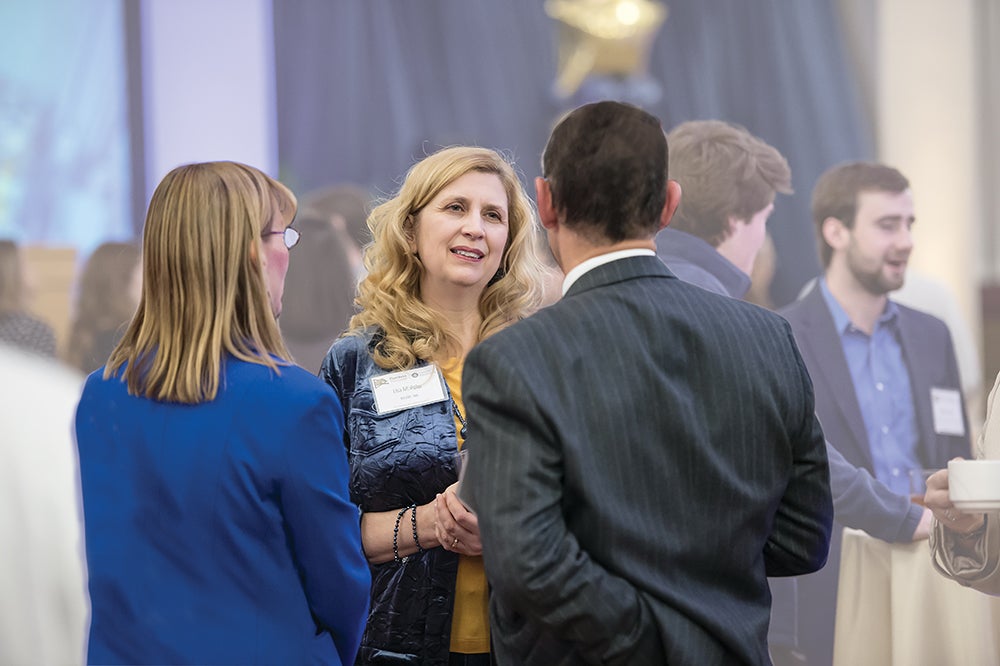Two years ago, University of Pittsburgh Chancellor Patrick Gallagher set out to disrupt the world of higher education financing. In October 2018, his persistence paid off with the launch of Panthers Forward. This one-of-a-kind program gives graduating students immediate debt relief in exchange for a voluntary pledge to pay it forward to future Panthers.
To mark the program’s kickoff, Gallagher gamely joined Pitt Magazine to interview Rohit Anand (A&S ’17), Joseph Kannarkat (A&S ’18), and Pat O’Donnell (ENGR ’14). The trio—all Pitt alumni—are founding members of Altian Education, a firm tasked with pushing Panthers Forward from Gallagher’s industrious headspace and into the innovation-starved higher education space.
Gallagher: When you’ve been sharing Panthers Forward with students, parents, and other alumni, how have you been describing it?
O’Donnell: It’s a program of Panthers helping other Panthers. Up to 150 participating seniors will receive a grant of up to $5,000, which the University will use to pay toward their eligible federal student loan balance upon graduation. These participants will be encouraged—but not required—to pay it forward to the next generation of students through monthly contributions.
Gallagher: So, this is not your typical student loan?
Anand: Right. What we’re saying is that Pitt believes in its students. There is no contractual nature to the grants because we know that our students are going to do amazing things in life and will be motivated to give back so that future students can succeed.
Kannarkat: The grants help recipients see the option to return the investment not as a debt, but as a personal way to make a contribution. You don’t have to be rich to give; every gift is important.
Gallagher: How did you select the Panthers Forward class?
Kannarkat: We used a comprehensive application process. The members of the first class are all graduating seniors with some federal student loans, and they are all in good academic standing.
Gallagher: How is Panthers Forward engaging the alumni community?
O’Donnell: Alumni can see this program as an investment in the future and in the success of Pitt students. All alumni can contribute to this initiative in different ways, like being part of our first group of dedicated mentors, which we’re calling Alumni Ambassadors.
Anand: Panthers Forward isn’t just about financial donations. There are many ways to pay it forward at the University. Alumni Ambassadors will work to build relationships with students who are walking where they once walked.
 Gallagher: When we talk about getting involved with your alma mater, it often sounds like getting involved with the administration or buildings on campus. But Panthers Forward is different—it focuses on connecting with current Pitt students. That’s on purpose, right?
Gallagher: When we talk about getting involved with your alma mater, it often sounds like getting involved with the administration or buildings on campus. But Panthers Forward is different—it focuses on connecting with current Pitt students. That’s on purpose, right?
Kannarkat: That’s right. The University is so much more than just its campus. It’s about community, and one way we build community is by connecting students with alumni.
Gallagher: So, how innovative—really—is this program?
Kannarkat: Panthers Forward is new ground for Pitt and, more importantly, for the higher education space, too. It’s a model for providing student loan relief, for bridging networks of students and alumni, and seeding cultures of giving that can benefit not just our Pitt communities, but communities everywhere.
Volunteering as a mentor gives me a great opportunity to pay it forward, taking my knowledge and experiences rooted in Pitt and using them to make a small impact on the lives of others.
Lisa Polar (BUS ’98G), a human resources executive from Coraopolis, Pa., and one of more than two dozen Alumni Ambassadors in the Panthers Forward program.
For more information about Panthers Forward, visit panthersforward.pitt.edu.
